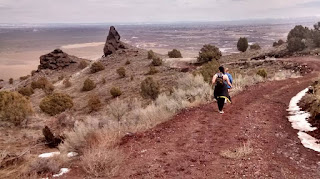Lesson 01: Geology in My Life
From the places we go, to the food we eat, to the cars we drive and the products we use, geology surrounds us. It's easy to forget how much we depend on the geological processes of the Earth. Idaho in particular is a geological hotspot (figuratively speaking). Not too far from Rexburg, we have the Menan Buttes, two of the largest volcanic tuff cones. This an amazing piece of geologic history that we are welcomed to explore and observe exposed igneous rock, such as obsedian. We are also close to Yellowstone, City of Rocks, the Tetons, and many other cool places to explore geology. We are even fairly close to the Rockies where the continental crust can be up to 70 kilometers (45 miles) thick! (Image from hike at Menan Butte)
Along with that Rexburg is a large farming community. In order to have a successful crops, farmers have to analyze the soil content, determine what minerals go in their fertilizer. The minerals in the soil will depend on what kind of rock it originated from and what minerals have been transported to the area. All of these factors involve geology in some way or another. The crops that these farmers grow often go to our grocery stores or farmer markets where we can directly eat the fruits (and vegetables) of geologic processes and considerations.
(Image from http://www.eastidahoonline.com/rexburg-farmers-market/)
Overall, the biggest thing that stood out to me in the reading was that there are cycles in geology. The mountains we climb today might be the soil people use to grow their crops 100 million years from now. All the processes, products, and places we observe now are all more connected than we think.

Comments
Post a Comment